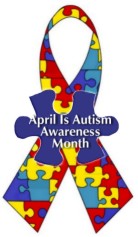Autism is part of who I am. Temple Grandin
It’s time for my annual Autism Awareness Month blog post. For those of you who are not aware of the reason why I write one every year; my eldest son has autism. April is just another month for our family since EVERY month is autism awareness month at our house.
Music is very important to Russell; he thrives when he listens. He loves all sorts of music, from Baroque (some Renaissance but not all) to 21st century, from Disney to musicals and Italian Pop. He loves The Swingles and piano music and orchestral works and chamber music and most choral pieces. He is not a fan of some modern church music—the happy/clappy stuff—and will make faces when he is forced to listen or will put his fingers in his ears. He has taste, which is not surprising since he has been surrounded by music of all sorts beginning in the womb. What is surprising is this; he’s non-verbal and by all accounts, intellectually challenged. Did I mention he has perfect pitch?
When he was first diagnosed, I was very young, with two other small sons. I didn’t know much about music therapy at that time but was furious my own profession would not include my darling boy. As the years went on, I learned music could be used to control his behavior or to reward him for behaving well or give him enjoyment and a leisure skill (before I was a special ed mom, I didn’t know many kids with challenges need to be taught how to use their free time) which was acceptable to society. Our musical household was doing just what we did, never realizing we were also helping Russell. Of course, I took him to all sorts of therapies, just as I took his brothers to their ‘cello and percussion and piano lessons. Russ took swimming with our Special Rec District and his brothers were in Little League.
I had to fight for Russell to be a music inclusion student in high school. At first, they told me he could try but, well, I was only a Mother so how could I possibly understand how challenging it would be? A few weeks after school started, I received a voice mail asking me to call his inclusion facilitator because they wanted to change his IEP. Returning the call, I was told he was doing so well in orchestra, they wanted him to stay for the whole class (instead of the first ten minutes I had settled for) and they needed my permission to amend the IEP. I wanted to tell them “See, I told you so” but resisted the urge; I got what I wanted so why rub it in I knew more about music than they?
We discovered his perfect pitch quite by accident. Both of his brothers played in a youth symphony; the older, played timpani and percussion and the younger played ‘cello. One year, when Russ was about 15 or so, the high school group was about to play and kept tuning and tuning and TUNING. Out of the blue, Russ started humming and his youngest brother (who played in the junior high ensemble, has perfect pitch himself and was sitting with us for the second part of the program) told us Russ was humming the pitch they should be playing. Russ was trying to give them the right pitch by humming it for them! One piano tuner told me he hates people with perfect pitch because Russ would occasionally hum the next correct pitch for him as he was tuning our piano. I told him he shouldn’t hate Russ because it’s the only thing he can do.
There are plenty of people like Russell out there; folks with challenges who have families much like ours. And yours. When you are asked to accept an inclusion student, think how you would feel if that student was your child or your niece or nephew or cousin or brother-in-law. Then do what you would want to be done for them. It will be more work for you, for sure. But it will be worth it and not just for them; FOR YOU. You will show your other students what compassion and tolerance is and how to accept someone who needs more help than they do. You will discover different ways to look at things, different ways to teach things and ways to overcome challenges along with an enhanced set of values. You will feel better about yourself, and others will feel better about you too.
It might be too great a challenge; for you and for them, through no fault of yours. If you honestly try to make it work and it doesn’t, you can still feel good you tried. Next time, it will work.



Leave a Reply
You must be logged in to post a comment.